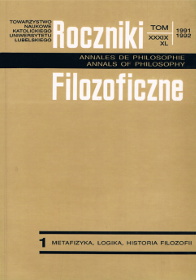On Aristotle’s Definition of the Prime Philosophy as Theology
Abstract
Aristotle used the term ϑεολογική twice when defining in this way the science of the separated and motionless Being, „if a substance of this kind exists”. In the past either ether was understood to be the separated and motionless Being or the Prime Motionless Mover, or a Mind thinking itself. According to I. Düring the Stagirite’s commentators were not able to reduce these conceptions to some uniform science of God because it is not there. Aristotle used the term only twice as a parenthesis, „um die schöne Dreizahl zu erreichen”, for he was first of all a physicist so that prime philosophy is „meta-physics” in Heidegger’s understanding of the word, or an extrapolation of physics, its insignificant supplement. The essence of Aristotle’s philosophy should be seen in posing questions and not in giving answers. The Stagirite’s predilection for „the triad” made him not only distinguish a third, besides physics and mathematics, science, but also − according to Düring − introduce ether as the substance of the heaven. However, Aristotle justifieshis inclination to trichotomies by cosmological-theological reasons (De caelo, I, 1) and mentions a purely physical reason that made him suggest that ether must be the substance of theheaven (Met., I, 3, 340 a 1-3). Besides, hasn’t the question of God’s existence and essence beenthe central question for great philosophers? The history of philosophical thought confirms that St Thomas Aquinas was right in saying: „fere tota philosophia ad cognitionem divinorum ordinatur” (In III-um Sent., dist. 24, a. 3).
Copyright (c) 1992 Roczniki Filozoficzne

This work is licensed under a Creative Commons Attribution-NonCommercial-NoDerivatives 4.0 International License.





